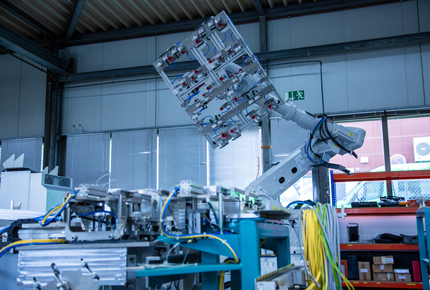
Automation is increasingly becoming the focus of industrial production companies and is decisively responsible for the new beginning of an industrial era – that of Industry 4.0, which was already described in more detail in the last article.
Automation enables various systems to act autonomously to achieve pre-defined goals and is therefore an important element in further increasing the efficiency of many processes – especially in production companies.
In the following article, we want to give an insight into when it pays to automate a company and which parts of a company can be automated, or where automation makes the most sense.
Automation is essential for a production operation in today’s world. Automation solutions are primarily aimed at increasing the profitability of a company.
It is therefore hardly surprising that more than nine out of ten companies in Germany have already automated important business processes – in other words, they use methods from the field of automation technology.
Today, almost every successful production company uses numerous automation solutions.
By incorporating automation technology, the companies expect to achieve far-reaching advantages in productivity, improved quality and the reduction of operating costs and human error sources.
Only a few areas of German industry remain unaffected by automation. In production and IT companies, for example, over half of all common processes are already automated.
Only seven percent of all companies in Germany are currently still without automation.
If one looks at the effects of an automated company, it is not understandable to do without automation solutions, especially in a manufacturing company.
But why is that? Have these companies simply missed the switchover? Or does it not make sense in all industry segments to fall back on automation technologies?
Often, artificial intelligences and robots appear too abstract for insufficiently trained employees to develop the desire to work more closely with the computer.
They have reservations about automated work and at the same time fear that they will not be able to operate the new technologies or even be replaced by them and ultimately have no job.
If you have missed the automation of processes in your company so far, no problem! With a clearly structured approach, clear goals and centralized knowledge, you will still succeed in automation.
It could be really simple. You give an order and your machines carry it out for you.
The time you save can now be better invested in administrative monitoring to find further optimization potential of your machines, instead of operating them yourself.
If your company is not yet so advanced in terms of digitization, you should test and start automation by means of small, local pilot projects in the individual departments. It is highly recommended to gain initial automation experience with small projects before automating large areas and activities.
To automate your business, you should introduce the so-called Center of Excellence (COE). Here you can bundle all expertise on automation and robot technologies that may later be relevant for your company. A COE aims to analyze the possibilities of automation with regard to the strategic direction of the company.
The basis for quick success is the selection of a suitable automation software and a suitable supplier. It is important that an individual concept for automation is developed, which is exactly adapted to the needs of your company.
We – the Schubert Group – have specialized in particular in the automation of various production plants, the modernization of existing plants as well as maintenance and repair tasks and have made a name for ourselves with innovative solutions in the field of process automation and control systems.
In principle, almost all manufacturing processes in your company can be fully or partially automated.
For this purpose, it is crucial to know the customer’s goals that are to be pursued by automating the plants.
Once the customer’s ideas are known, analytical models of the customer’s existing machines and plants are designed and tested for possible automation potential.
Subsequently, technical equipment is connected between man and machine to replace or supplement human capabilities and thus enable an autonomous production process.
With a wide range of robot technology and application technology, we exclusively integrate systems for automation in your company, which are equipped with the latest robot and sensor technology and guarantee process reliability and a high degree of quality.
We integrate fully automated systems as well as partially automated manual workstations and pursue one goal:
high efficiency for your company and the best possible customer benefit.
Because we know: the more complex the automation system is, the more important is an optimally sophisticated concept for operation.
In addition to the automation of your company, we can also provide additional training and courses for the operation of automated systems as well as safety instructions.
If you have further questions about the possibilities of automation, please contact us. Or inform yourself here.